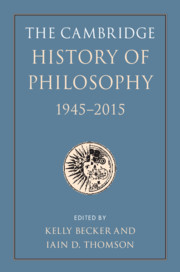Book contents
- The Cambridge History of Philosophy, 1945–2015
- The Cambridge History of Philosophy, 1945–2015
- Copyright page
- Contents
- Contributors
- Preface and Acknowledgments
- Introduction
- Part I Analytic Philosophy
- Section One Language, Mind, Epistemology
- Section Two Logic, Metaphysics, Science
- 10 Logic in the Second Half of the Twentieth Century
- 11 (Re)discovering Ground
- 12 Lewis’s Theories of Causation and Their Influence
- 13 Naturalism from the Mid-Twentieth Century to the Present
- 14 The History of Philosophy of Science
- 15 A Modern Synthesis of Philosophy and Biology
- Section Three Analytic Moral, Social, and Political Philosophy
- Section Four Analytic Aesthetics and Philosophy of Religion
- Part II Continental Philosophy
- Part III Bridge Builders, Border Crossers, Synthesizers, and Comparative Philosophy
- Part IV Epilogue: On the Philosophy of the History of Philosophy
- References
- Index
14 - The History of Philosophy of Science
from Section Two - Logic, Metaphysics, Science
Published online by Cambridge University Press: 08 November 2019
- The Cambridge History of Philosophy, 1945–2015
- The Cambridge History of Philosophy, 1945–2015
- Copyright page
- Contents
- Contributors
- Preface and Acknowledgments
- Introduction
- Part I Analytic Philosophy
- Section One Language, Mind, Epistemology
- Section Two Logic, Metaphysics, Science
- 10 Logic in the Second Half of the Twentieth Century
- 11 (Re)discovering Ground
- 12 Lewis’s Theories of Causation and Their Influence
- 13 Naturalism from the Mid-Twentieth Century to the Present
- 14 The History of Philosophy of Science
- 15 A Modern Synthesis of Philosophy and Biology
- Section Three Analytic Moral, Social, and Political Philosophy
- Section Four Analytic Aesthetics and Philosophy of Religion
- Part II Continental Philosophy
- Part III Bridge Builders, Border Crossers, Synthesizers, and Comparative Philosophy
- Part IV Epilogue: On the Philosophy of the History of Philosophy
- References
- Index
Summary
The philosophy of science in its broadest sense includes all philosophical questions asked about or within the sciences. It overlaps with epistemology because science is taken to be among the best available means of acquiring knowledge, if not the best. It overlaps with metaphysics, and philosophy of mind and language, because scientific theories tell us about the nature and functioning of matter and ourselves. Issues that are now considered core to the philosophy of science, such as the problem of induction and the nature of space and time, played a pivotal role in the development of philosophy from Descartes to Kant through Newton, Leibniz, and Hume, and thence to Russell, Wittgenstein, and the Vienna Circle. Philosophy of science continues to study such old and new questions of knowledge and reality. Furthermore, philosophy of science has also always overlapped with ethics and political philosophy. At the turn of the scientific revolution Francis Bacon envisioned New Atlantis, a society based on communal inquiry and collective action bringing the benefits of technology to its populace. No philosopher of science after 1945 could doubt the social nature of science and the benefits of science and technology, but nor could they doubt its potential for destruction. By the 1990s climate change was reckoned by many scientists to be a threat to much, if not all, human life on Earth. The ideas of the underdetermination of theory by evidence and paradigms were weaponized in political debates that ensued and are charged with a significance that goes way beyond the academic study of the philosophy of science (Oreskes and Conway 2010).
- Type
- Chapter
- Information
- The Cambridge History of Philosophy, 1945–2015 , pp. 189 - 209Publisher: Cambridge University PressPrint publication year: 2019
- 2
- Cited by



